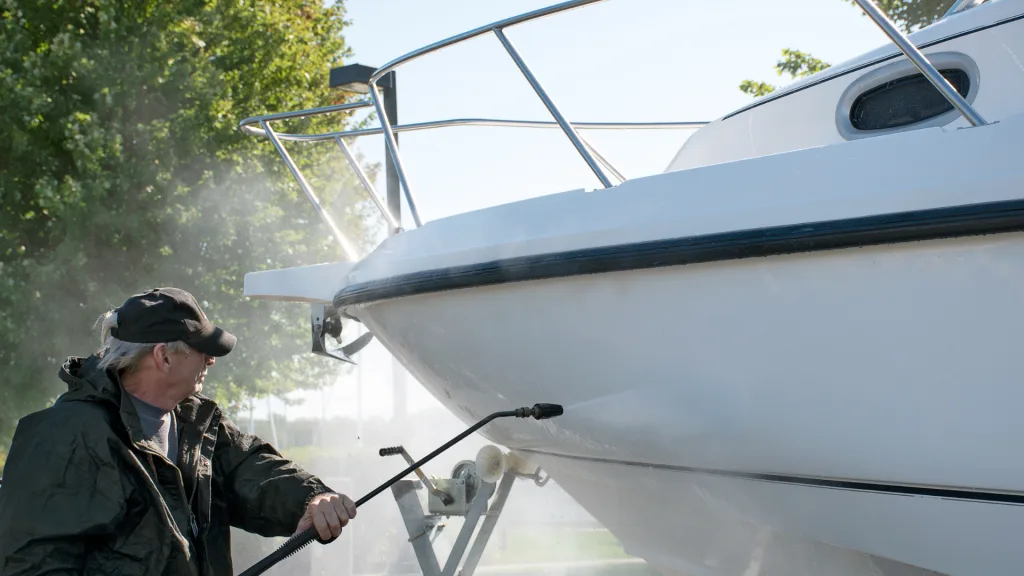Romantic though it may seem, living on a boat can actually be illegal. You’d think residing in a tiny cabin moored at a local marina wouldn’t attract attention. But you’d be wrong.
Several boat owners recently learned that living on their boats full-time is illegal. Depending on local laws and permitting requirements, liveaboard boaters may be in violation of the law.
Join us as we check out what it means to be a liveaboard and what you’ll need to do to ensure you aren’t a marina pirate.
Let’s go!
What Does it Mean To Be a Liveaboard?
The simplest definition of a liveaboard is someone who lives on board a boat full time. Similar to full-time RVing, the liveaboard lifestyle isn’t for everyone. But, for those drawn to life on the water, moving onto a boat is the dream.
Over the years, several concepts of what it means to live on a boat surfaced. In the early 2010s, seasteading became the buzzword for folks who wanted to drop out of society.
Seasteading means different things to different people. For liveaboards, it means living basically for free. No taxes, no mooring fees, free food, and no mortgage, it’s a dream lifestyle for some.
Most commonly, you’ll see liveaboards in marinas and on mooring buoys. Marinas offer the most amenities, like an RV park, with showers, laundry, dining, and neighbors.
Mooring on a buoy puts you a bit further out, fifty feet from the shoreline in most coastal areas. So if you moor to a buoy, you’ll be off the grid, like boondocking.
Best for single individuals or very close couples, liveaboards are a different breed.
Let’s look at some of the benefits of living on a boat.

The Benefits of Living on a Boat
Boat living offers significant benefits, especially for those who want a life outside the grid. As rent prices soar and home prices go even higher, the lure of the waves calls to more and more folks. And while the cost of entry can be lower for boat living, the reality is that new vessels are comparable to an RV or home.
Once you’ve covered the cost of entry, living on a boat can be fairly inexpensive. Even paying mooring fees of $500 or more a month, you’re likely paying less than rent. Include the cost of heating and cooling a much smaller space, and you’re also saving money on utilities.
The right kind of liveaboard also offers endless travel. If you’re one of the remote workers of the world, anywhere you can get internet service is your office. You’ll be able to enjoy visiting new areas with few restrictions.
If your partner is on board with the lifestyle, you’ll likely grow closer because of the tight quarters.
Like an RV park, mooring in a marina puts you in rare company. Musicians, artists, engineers, and vagabonds feel drawn to the lifestyle. You’ll definitely have some exciting neighbors.
Marina life isn’t for everyone, though. Let’s check out some of the cons of the lifestyle.
The Disadvantages of Living on a Boat
Despite the relatively low cost of entry, boat living has some high costs attached. You’ll pay for slip fees, permits, insurance, and dumping fees, to name a few.
While not technically illegal, boat living requires special permits in most areas. Without a license, you’re risking eviction or loss of your vessel.
Insurance prices range depending on whether you live in a marina or out on the open water. Your boat must also keep necessities handy, so storage is an issue.
You’ll also want to ensure you can fix almost anything that can break on your boat. Mechanics don’t make house calls at sea; if they do, the price is insane.
The comforts of home won’t follow you on a liveaboard adventure. Hot showers, laundry, privacy, and bubble baths are just some of what you’ll give up for a life at sea.
Pro Tip: Considering buying a boat? Check out This $8,100 RV Camper That is also a Tricycle & Boat (Yes, You Read That Correctly).

Is it Cheaper to Live on a Boat than in a House?
Living on a boat full-time can save you money in certain areas. But in other ways, it can be just as expensive as living on shore in a house. Some parts of living on a boat will cost you more than a traditional brick-and-mortar dwelling.
Costs that pile up may swamp even the most budget conscious. Some things to consider are insurance, waste management, and repairs.
Insurance on a liveaboard is necessary and is more per dollar than most homeowner policies.
Each marina charges waste management fees for pumping out waste tanks. Don’t even consider releasing it into the ocean; fines for illegal dumping are significant.
A boat repair usually runs around twenty percent higher than the same repair on a home. Since you’re always exposed to the elements, parts wear out faster too. Even if you’re fixing things yourself, expect to see higher costs all around.
Some folks have figured out how to live on a boat as cheaply as possible. Seasteading is the concept of living on a boat for next to nothing or for free. In reality, that’s a nearly impossible ask for those trying to live on the right side of the law.
Is Living on a Boat Actually Illegal?
Living on a boat isn’t actually illegal. You’re usually good if you take care of local taxes, mooring fees, permits, and insurance. But if you’re not following local ordinances, you’ll be in hot water.
Georgia is a good example. In the 1990s, the state legislature made living on a boat for more than thirty days a year illegal. Similar to no-camping laws, politicians had a specific segment of society in their sights, poor folks.
Several run-down houseboats had neighbors concerned about property values. So legislators passed the law restricting how long you can live on your boat. Folks started skipping Georgia altogether, and the state got a reputation for being unfriendly to liveaboards.
In Hawaii, an unlicensed liveaboard ended in the boat owner losing everything. The citation included a $30,000 fine and a two-year ban on permitting for the vessel.
Make sure you know the local ordinances, and you’ll be able to sleep easily.

Why is Living on a Boat Sometimes Illegal?
In some areas, living on a boat poses a significant hazard. Even with good citizens living on board, boat life is discouraged or illegal in certain states.
As tough as it is to accept that a state doesn’t want you living on its waters, the reasons make sense. Water quality is a big issue for some regions, especially on lakes or in delicate ecosystems. Even if you operate with best practices, your boat is still polluting to a degree.
For folks living alongside waterways, liveaboards are a nuisance. Local governments often get property taxes from the owners and are likely to listen to them. Complaints about views and sanitation are hard to argue with, especially from constituents.
Where in the U.S. Can You Liveaboard?
There are some places you can liveaboard legally, and they’re worth checking out. From the major coastlines and the Gulf coast to the Ozarks and the Great Lakes, you’ll find some great options in these areas.
Chesapeake Bay, Maryland, is the perfect place to moor for a while, especially for anglers. Fishing in the area can’t be beaten, and the locals are a maritime-friendly bunch.
On the other side of the country, San Diego, California, offers some of the best boat living we’ve seen. Access to fantastic food and cultural options, surfing, and the perfect climate. San Diego is one of our top picks.
Corpus Christi, Texas, is another great option for anglers. Access to the Gulf of Mexico, deep water fishing, and excellent food are just a few of the perks. Mexico is also just across the water, so make sure to explore.
The Lake of the Ozarks, a 55,000-square-mile lake in Missouri, rounds out our list. Leaving the uncertainty of open water, the lake is a picturesque option for liveaboards. Made famous by the Netflix series, the lake is just as beautiful as it seems on screen.
Pro Tip: You’ll love living on your boat on one of these 10 Unpolluted Lakes in the USA (for now).
Is Living on a Boat Worth It?
If you’re already open to life on the road, life on the water is just another small step. With the wind in your sails and the right life partner, boat life is just another big adventure. Even though costs and maintenance may make some aspects harder, the simplicity of life on the water can’t be beaten.
For those willing to make the jump, boat life offers the best travel has to offer.
Would you consider living on a boat full-time?
We’ll Help You Find the Best Free Camping in the USA
You should give it a try!
As a matter of fact, these free campsites are yours to enjoy. Every time you pay federal taxes, you’re contributing to these lands.
Become a FREE CAMPING INSIDER and join the 100,000 campers who love to score the best site!
We’ll send you the 50 Best Free Campsites in the USA (one per state). Access the list by submitting your email below: